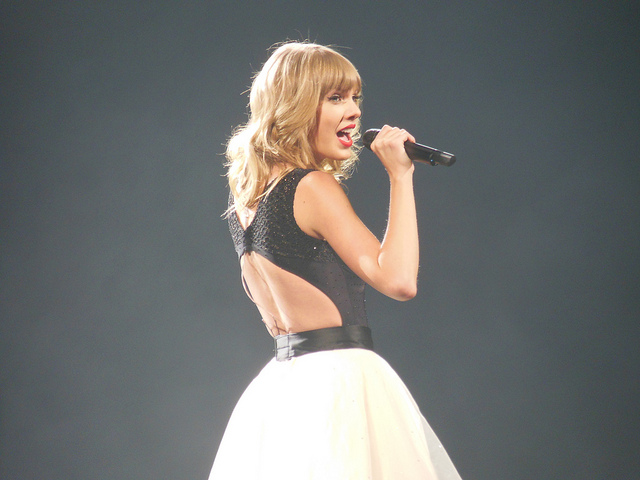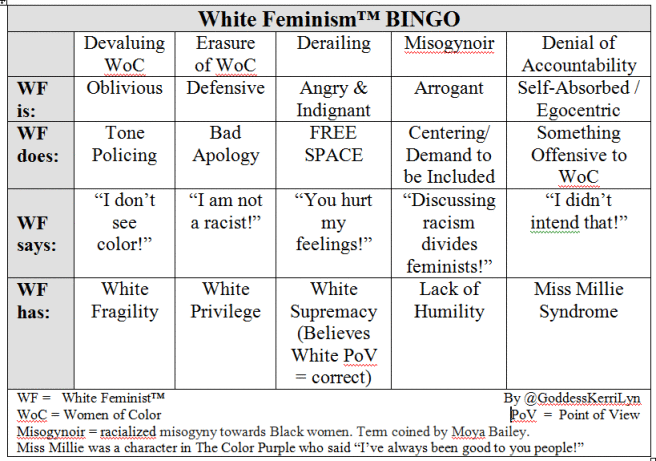Open Letter by Lorraine Berry
Why Feminism Is Not Just About Your Squad

Dear Taylor:
I must admit I’ve resisted writing this letter to you. It’s not because you’re famous, and I’m not. It’s because the main thing I’ve gleaned about you as a real person, based on what pokes out beneath your public persona, is that you care what other people think. And despite my reputation for clumsy outspokenness, I don’t like to hurt anyone’s feelings.
You have declared yourself to be a feminist many times, and I like that. Just the act of claiming the “F” word is still radical in many circumstances. I’m also not one of those grumpy old women who think you and your girl squad aren’t real feminists just because you’re popular and pretty.
But I do feel obligated, as one white feminist to another, to remind you of a few things. On the day that I began writing this letter—July 8, 2016—I’d slept very little. It wasn’t just the heat in Florida, where I live. That week, Philando Castile and Alton Sterling, two black men shot by police in two different cities, died on video before our eyes. It’s a distress call that should rouse us all from our deepest slumbers. So why does it seem as if Beyoncé is the only celebrity feminist who has heard it?
In June 2015, after the Supreme Court legalized same-sex marriage, you tweeted, “‘And you can want who you want….’” You tagged it with #lovewins and #FINALLY. You’ve received many social-media tributes to your advocacy for gay teens. This past June, when 49 people were murdered at the Pulse nightclub in Orlando, you tweeted “With a heavy heart…,” followed by a link to an earlier message:
As you bury your loved ones this week, please know that there are millions of us sending you love and our deepest sympathy in the face of this unthinkable and devastating tragedy.
Supportive messages like this, from a young pop star with more than eighty-million Twitter followers, can have great impact. That June 2015 tweet has received close to 160,000 likes; the “heavy heart” one has been retweeted more than 30,000 times.
And yet, Taylor, to date you have been silent about racism in the United States. In posting your solidarity with those who had been killed in Orlando, you acknowledged that most were gay but failed to point out that many were people of color.
I don’t believe we get to pick and choose whose struggle for civil rights we align ourselves with. Beyoncé has embraced the idea that feminists stand with everyone’s struggle. In her Facebook posts and tweets, she’s recommended some terrific works about intersectional feminism like We Should All Be Feminists by Chimamanda Ngozi Adichie. We’re not living in a post-racial society any more than we’re living in a post-feminist one, and I believe in my bones as a feminist that we all have to speak out about basic inequalities—especially those who hold celebrity microphones.
I admit I’ve wondered if you were a closet segregationist, although I know that isn’t fair. Based on your ever-evolving social-media footprint, I see you had black dancers on your just-completed 1989 tour. I see you get into Twitter beefs with Kanye West. I see you proclaim your love for Mary J. Blige. I see you listening to Drake songs in the hilarious ad you did for Apple Music, in which you play at being a rapper, then make fun of your own clumsiness by falling off a treadmill. I see you fighting with and then making up with Nicki Minaj.
Your “fight” with Minaj, however, is a good example of the problem. The gossip press turned it into a catfight, but “woke” critics (“woke” being the new word for people who are awake to the ways white privilege works) saw the irony in you accusing Minaj of being mean. In reality, it seemed you just assumed she was talking about you when she commented that the MTV Video Music Awards have a tendency to reward white performers for artistry over their black peers. As Minaj responded to you: “Huh? U must not be reading my tweets. Didn't say a word about u.”
Despite your willingness to “take from black culture, you are unwilling to show up for black lives,” to quote white hip-hop artist Macklemore in his song “White Privilege II.” He’s gotten a lot of heat for coopting a black art form, but has always been aware of his precarious position within the genre, rapping the first “White Privilege” as far back as 2005. He released “White Privilege II” in 2014 after the killing of Michael Brown in Ferguson, Missouri. In the 2014 version, he name-checks the more egregious white borrowers like Elvis Presley, Eminem, and Iggy Azalea, and his list doesn’t include Taylor Swift. But when you feature Kendrick Lamar rapping over the back of your smash “Bad Blood,” I think you’re implicated, Taylor.
Instead, you and other young white celebrities like Lorde, Karlie Kloss, Cara Delevingne, and Ellie Goulding preach a feminism of friendship, of girls forming alliances. It’s all about your squad, “this entire league of incredible girlfriends that I have,” as you gushed in a 2014 Esquire interview.
With your collective good looks and beaucoup bucks, your aura of self-confidence is infectious. The sexual energy you exude in your songs is that of a young woman who knows that being with a partner is a choice and that you’ll always have the strength of ego to walk away from a damaging relationship. I appreciate the positive messages you send to your Twitter fans, encouraging them to chase their dreams. You seem to understand we’re all in this together. In a 2015 Maxim cover story, you said:
I didn’t see myself being held back until I was a woman…, the double standards in headlines, the double standards in the way stories are told, the double standards in the way things are perceived. A man writing about his feelings from a vulnerable place is brave; a woman writing about her feelings from a vulnerable place is oversharing or whining. Misogyny is ingrained in people from the time they are born. So to me, feminism is probably the most important movement that you could embrace, because it’s basically just another word for equality.
No one should diss a young woman’s right to cut loose in the ways that young men have been doing in Western culture at least since the Renaissance. The thing is, Taylor, feminism is about a hell of a lot more than girl power. It’s not just the right to dance with your girlfriends on the dance floor or to go on a pub crawl or to behave like adolescent badasses. Feminism is not a fashion accessory. If proclaiming your right to equality is to mean anything, it’s about showing up to lend your privileged voice to those of your feminist sisters who are not rich, famous, or white.
Notice that I didn’t say “help.” I have no desire to replicate relationships of power, and you may be hesitant to speak about black pain. I understand that hesitation, but I’m not telling you to coopt black voices. I’m asking you to amplify those voices.
In some cases, I’d just like you to retweet things from other feminists. Why? Because your platform and theirs can combine for powerful results. For instance, when Beyoncé posted on her website and tweeted, “We are still struggling with the issue of inequality and the lack of value for a black man’s life” in 2013, you could have retweeted with the tag #amplify.
At other times, you can take the lead yourself. Here are some sample tweets I wrote that you could direct to your followers and members of your squad. The Ed Sheeran reference is from his song “Thinking Out Loud.” You can nod to the creative work of your friends but also connect it to events beyond the personal:
WE SHOULD ALL BE FEMINISTS by Chimamanda Ngozi Adichie #squadreads
I’m still struggling to understand privilege. Here’s a great primer from #FridayFeminism: http://bit.ly/1sdYA67
#Squad reading goals: Ta-Nehisi Coates: BETWEEN THE WORLD AND ME. @edsheeran “Hoping that you’ll understand”
Of course, you’re the songwriter, Taylor, and I would never put lyrics in your mouth. But I imagine that just as you’ve spoken of awakening to feminism, becoming woke to white privilege could show up in your songs, too. After all, someone who can sing that finding herself is everything understands that there is more to life than girl meets boy. Just as there’s more to feminism than white girls leaning in only for their friends.
In sisterhood,
Lorraine Berry
More Reading: Waking up to Racism
"10 Common Things Well-Intentioned Allies Do that Are Actually Counterproductive" by Cody Charles, Everyday Feminism, October 6, 2015.
"A 5-Step Guide for Macklemore and White Allies Afraid of Doing Anti-Racism 'Wrong'" by Maisha Z. Johnson, Everyday Feminism, January 24, 2016.
"This Is What White People Can Do to Support #BlackLivesMatter" by Sally Kohn, Washington Post, August 6, 2015.
"How Taylor Swift Is the Most Dangerous Type of White Woman, Explained" by Damon Young, VSB, July 18, 2016.
"About Kim Kardashian’s Receipts and the Damsel in Distress, Taylor Swift" by Luvvie, Awesomely Luvvie, July 18, 2016.
"5 Important Reasons I Can't Love Taylor Swift Anymore" by Gina M. Florio, Bustle, January 5, 2016.
"What Is White/Male Privilege?" by Marina Watanabe, Feminist Fridays (vlog post on YouTube), October 14, 2014.
Platform, The Movement for Black Lives.
"White Feminism Bingo" by Goddess Kerri Lyn, FOCUS, October 29, 2015:

Bingo card republished here by permission.
Publishing Information
- “‘And you can want who you want…’” tweet by Taylor Swift @taylorswift13, June 26, 2015.
- “With a heavy heart” tweet by Taylor Swift @taylorswift13, June 17, 2016.
- “Beyoncé: On Feminism, Motherhood, and the Real Message in ‘Formation,’” interview with Beyoncé, Elle, April 5, 2016.
- “Beyoncé Reportedly to Feature Trayvon Martin, Tamir Rice, and Mike Brown in New Video” by Shenaqua Golding, Vibe, March 27, 2016.
- “Watch Taylor Swift Fall off a Treadmill in an Apple Music Ad” by Jason Stone, Guardian, April 7, 2016.
- “Taylor Swift and the Silencing of Nicki Minaj” by Spencer Kornhaber, Atlantic, June 22, 2015.
- “Macklemore Talks Name-checking Iggy Azalea and Eminem on 'White Privilege II,'” Rap-Up, March 3, 2016.
- “Why Taylor Swift Welcomed You to New York,” interview with Taylor Swift by Scott Raab, Esquire, October 20, 2014.
- “Taylor Swift Celebrates International Women’s Day, Asks Fans to Pledge for Parity” by Chanel Adams, Inquisitr, March 8, 2016.
- “Taylor Swift Tops the 2015 Maxim Hot 100,” interview with Taylor Swift by Jessica Roy, Maxim, May 11, 2015.
- “Taylor Swift: ‘Feminism Is Probably the Most Important Movement that You Could Embrace,’” commentary on Maxim interview by Alex Rees, Cosmopolitan, May 20, 2015.
- “#ACTNOW 4TRAYVON,” posted on Beyoncé’s website, July 19, 2013.
Art Information
- "Taylor Swift RED Tour" © Jana Beamer; Creative Commons license.
 A former creative writing professor, Lorraine Berry writes on a variety of literary, feminist, and social justice issues at outlets like the Guardian, Raw Story, LitHub, Catapult—and, of course, Talking Writing, where she is a contributing editor. She and her partner Rob Stiene are the principals at amberSands Creative, a creative services company. She lives 300 yards from the beach and tries to spend part of each day observing pelicans and floating in the ocean.
A former creative writing professor, Lorraine Berry writes on a variety of literary, feminist, and social justice issues at outlets like the Guardian, Raw Story, LitHub, Catapult—and, of course, Talking Writing, where she is a contributing editor. She and her partner Rob Stiene are the principals at amberSands Creative, a creative services company. She lives 300 yards from the beach and tries to spend part of each day observing pelicans and floating in the ocean.
